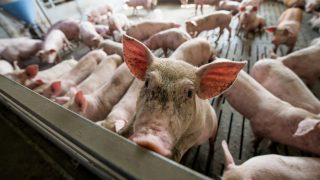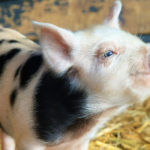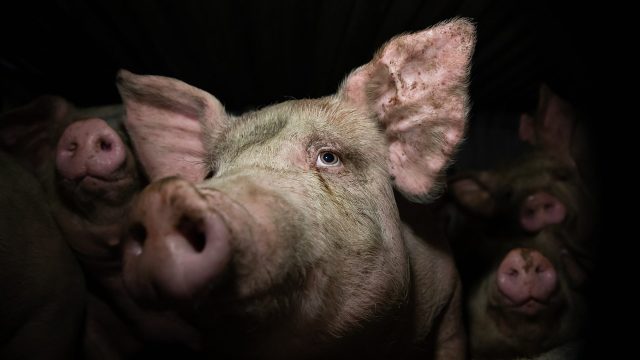
Stimulus Packages Require Forward Thinking to Safeguard America’s Future Health
Animal Legal Defense Fund calls on Congress to respond to COVID-19 by proactively addressing the root causes of pandemics
WASHINGTON, D.C. – The COVID-19 pandemic has exposed weaknesses in industrial animal agriculture that require immediate attention to protect workers, consumers, and the population from future outbreaks and pandemics. As it stands, the next global pandemic is inevitable barring fundamental changes in how humans produce their food, and every action the U.S. government takes from here will determine whether these challenges remain. At a minimum, the congressional stimulus packages designed to address the impacts of the current pandemic should not promote these dangerous agricultural practices. At best, the stimulus packages would provide an opportunity to encourage changes that would help prevent future outbreaks.
“The suggestion that American life can, or even should, return to ‘normal’ is dangerous,” says Animal Legal Defense Fund Executive Director Stephen Wells. “It would be irresponsible not to take action to preempt the next pandemic now — at this pivotal moment, when the public is already forced out of its normal routine and most receptive to change.”
COVID-19, like most deadly contagious diseases before it, originated from close interaction between humans and other animals. It is not the first of its kind, and it will not be the last. The 2009 outbreak of H1N1, the so-called “swine flu,” claimed the lives of over 12,000 Americans. During that outbreak, we had the benefit of H1N1 symptoms that developed faster than those of COVID-19 making it easier to identify — and easier to isolate. But when the ability to infect increases along with the severity of symptoms, the consequences can be dire for humanity. Such was the case with the 1918 Spanish flu outbreak that ravaged the world for almost two years — ultimately responsible for over 50 million deaths. The common denominator is our direct interactions with animals that poses the risk, a risk that has greatly increased with the intensive confinement of animals on today’s factory farms.
Congress has a chance to lead in a way that directs the country toward a healthier future, minimizing the likelihood of these types of pandemics, rather than only dealing with the daily challenges of the virus. Leadership from Congress must recognize that the conditions of factory farms provide a breeding ground for viruses and bacteria alike. The intense confinement alone requires animals to be drugged with preventative antibiotics to suppress regular outbreaks of disease. This overuse has led to the rapid adaptation of bacteria to the point scientists warn we are barreling toward superbugs that modern medicine will not be able to treat.
Factory farm and slaughterhouse workers are traditionally low-income and members of disadvantaged communities. The Pew Research Center estimates that roughly one quarter of farm workers are undocumented, increasing their vulnerability to abuse and exploitation. Even now, factory farm and slaughterhouse workers are deemed “essential,” despite the fact that these individuals work in extremely close proximity to other workers, animals, and biohazardous materials, in conditions that regularly result in severe breathing problems — putting them at significant risk for complications should they contract COVID-19. Most factory farm workers, regardless of status, do not have access to health care through their employers, and outbreaks have already been reported at pork processing plants in Iowa, South Dakota, and Pennsylvania. Clearly, we cannot expect viruses to be contained within these populations. By turning a blind eye to these realities, we are creating the conditions for ongoing perpetuation of this virus throughout the greater community.
The pandemic has proven these issues and others are not siloed and addressing each is critical to ensuring the prevention of a future outbreak and the wellbeing of both humans and animals. Factory farming pollutes the environment, forces workers to labor in unsanitary conditions, and exacerbates our changing climate as vast quantities of animals are bred in inhumane conditions to be sold while releasing emissions into the atmosphere. Using a low labor model that eliminates jobs to increase profits only worsens the conditions for animals, employees, and those who live near these facilities, while increasing the risk of future pandemics.
The Animal Legal Defense Fund, the nation’s preeminent legal advocacy organization for animals, urges Congress to pursue stimulus packages that will transform our food system by allocating funding toward incentivizing the institutional changes needed to reduce the threat of another virus gripping the U.S. and global community while restricting funding to industrial animal agriculture.
To date, Congress’s reaction to the pandemic, and resulting economic crash, has been reactive, which was necessitated by the urgency of the response required. But as we head into future rounds of legislation, we must recognize that business as usual will not protect us from the next pandemic.
Our government has a responsibility to be forward-thinking and rebuild the food production system to avoid future pandemics. While there are differing prescriptions for Congress to address these issues, it’s critical that any funding for agriculture in the next stimulus bill includes oversight, transparency, and strict reporting standards for zoonotic risk at all USDA regulated facilities.
“We need to accept that factory farming is killing us, through consumption-related illnesses, environmental degradation, and infectious diseases,” says Wells. “We must do something to change it — and now is our chance.”
Sign Up!
Join the Animal Legal Defense Fund's email list to stay up to date on lawsuits, legislation, and regulations affecting animals.
Focus Area
How We Work
Related
-
ALDF Partners with Advocates to Challenge EPA for Discarding Slaughterhouse Water Pollution Rules
10 Organizations petition federal court over EPA’s abandonment of rules to reduce pollution from meat processing industrySeptember 19, 2025 News -
Pigs and Public Health Act Reintroduced in the U.S. House to Prohibit Slaughter of Downed Pigs
Bill will reduce the risk of zoonotic disease transmission and foodborne illness by establishing new standards for non-ambulatory, or “downed” pigsJuly 25, 2025 Press Release -
Lawsuit Filed to Force USDA to Provide FOIA Documents Related to the Beef Checkoff Program
The agency has a history of approving promotional content funded by the program with false and misleading claims about beef’s environmental impactsJuly 17, 2025 Press Release




